Chevrolet Corvette Stingray 1973
- Price:
- Condition: Used
- Make: Chevrolet
- Model: Corvette
- Type: Coupe
- Trim: Stingray
- Year: 1973
- Mileage: 28,000
- VIN: 1Z37J3S432560
- Color: Red
- Engine size: 350 CI
- Power options: Air Conditioning
- Fuel: Gasoline
- Transmission: Automatic
- Interior color: Tan
- Options: Cassette Player
- Vehicle Title: Clear
- Location: Cottonwood, Arizona, United States
Description
- 350 CI small block engine
- Automatic transmission
- Air conditioning
- Leather seats
- 4-barrel carburetor
- Edelbrock Performer RPM intake manifold
- Chrome valve covers and air cleaner
- Last year for chrome rear bumper
- Body-color urethane front bumper
- Painted T-Tops
- Mille Miglia Red with Saddle interior
- Rally wheels with trim rings and center caps
- BF Goodrich Radial T/A tires
- Late production car, June 1973
When Chevrolet introduced its third-generation Corvette in 1968, it caused quite a stir. Longer, lower, wider and swoopier than the outgoing Corvette, it remarkably reflected upcoming trends earlier than most cars. Offered again in coupe and convertible guises, 1968 was the year T-Tops made their debut on Corvette. In 1973, Corvette received a host of improvements to noise, vibration and harshness, eliminating 40 percent of the interior noise experienced in previous Corvettes. The front end lost the chrome bumper in favor of a more modern body-colored urethane bumper, a feature that added 35 pounds to the car. While the 454 was a monstrous engine, most motoring enthusiasts preferred the small-block 350, which helped Corvette maintain an excellent sense of balance. This 1973 Corvette Stingray is one of the last 1973 models built, rolling off the line in June 1973. The 350 CI V-8 is dressed with a chrome air cleaner and valve covers and fed by a 4-barrel carburetor bolted to an Edelbrock Performer RPM intake manifold. Finished in a highly desirable color combination, the automatic transmission makes the car easy for anyone to enjoy. The last year for the chrome rear bumper, it's the first year for the urethane front bumper, lending an air of one-year-only uniqueness. Painted Mille Miglia Red, the car rides on Rally Wheels with trim rings and center caps wrapped with BF Goodrich T/A radials. Inside the car features Saddle-colored leather seats and air conditioning. Perfect for an open-top cruise, or closed-coupe jaunt, these Corvettes represent the end of the chrome bumper Corvette era.
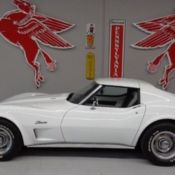 1973 Chevrolet CORVETTE STINGRAY
1973 Chevrolet CORVETTE STINGRAY
Mileage: 74,916
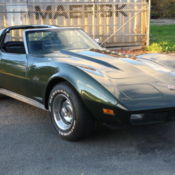 1973 Chevrolet Corvette Stingray with T Top
1973 Chevrolet Corvette Stingray with T Top
Mileage: 125,573
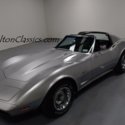 1973 Chevrolet Corvette 454 Stingray
1973 Chevrolet Corvette 454 Stingray
Mileage: 26228
 1973 Chevrolet Stingray Corvette
1973 Chevrolet Stingray Corvette
Mileage: 36,705
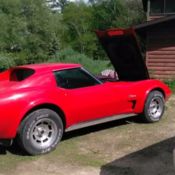 1973 Chevrolet Corvette Stingray Red T-Top
1973 Chevrolet Corvette Stingray Red T-Top
Mileage: 41,000
 1973 Chevrolet Corvette C3 Stingray
1973 Chevrolet Corvette C3 Stingray
Mileage: 69464
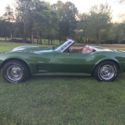 1973 Chevrolet Corvette Stingray Convertible
1973 Chevrolet Corvette Stingray Convertible
Mileage: 62683
 1973 Chevrolet Corvette Stingray # Matching
1973 Chevrolet Corvette Stingray # Matching
Mileage: 90,560
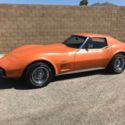 1973 Chevrolet Corvette Stingray - California car
1973 Chevrolet Corvette Stingray - California car
Mileage: 34,200
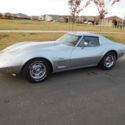 1973 Chevrolet Corvette Stingray Coupe
1973 Chevrolet Corvette Stingray Coupe
Mileage: 35,381








